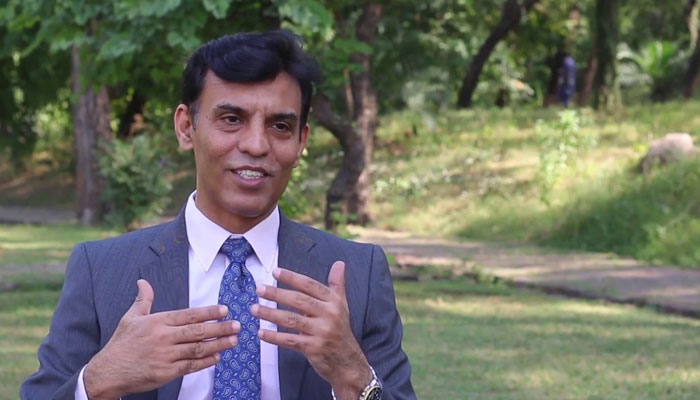‘Climate change an imminent pandemic but no one took it seriously’
Islamabad: Climate change is a pandemic in the making as there is rise in temperature, scarcity of water and un-breathable air in the world, but most governments are not taking it seriously, said Executive Director of the Sustainable Development Policy Institute Dr Abid Qaiyum Suleri.
During an international online webinar ‘State of Climate Governance Post-COVID-19’ organised by the SDPI here, Dr Suleri said novel coronavirus (COVID-19) was a black swan event (low probability very high impact). “We were warned that a novel virus may threaten mankind, but no one took it seriously and now the planet is suffering,” he said.
The SDPI executive director said by learning a lesson from COVID-19 pandemic and its socioeconomic impact, the world must take climate change as a real and serious threat and get prepared for it. He said post coronavirus, the world should continue spending on building resilience against climate change, otherwise the future will be very bleak.
Dr Saleemul Haq, director at the International Centre for Climate Change & Development, Bangladesh, said goal of limiting global temperature increase to well below 2 degrees Celsius had become less and less achievable with every single day, as the world was not doing enough for it.
“COVID-19 is just a smaller and faster version of how the impacts of climate change will be. We talk about reducing the steepness of the curve for the virus, the same applies for climate change in a bigger way,” he said.
Stressing the need to act before the situation, the director said acting after the impact would be useless. “The global leaders have an important role to play in decision-making regarding their openness to listening to climate science,” he said, adding that the relative impact of the leaders who take early action is based on science and making difficult decisions such as taken by Taiwan, Germany, and Singapore.
Dr Fahad Saeed, regional climate scientist at Climate Analytics Science, Germany, said currently, the world was releasing 42 gigatonne emissions per year that should reduce to half by 2030 otherwise the world would reach the end of carbon budget within 10-15 years.
-
 King Charles' Andrew Decision Labelled 'long Overdue'
King Charles' Andrew Decision Labelled 'long Overdue' -
 Timothee Chalamet 'forever Indebted' To Fan Over Kind Gesture
Timothee Chalamet 'forever Indebted' To Fan Over Kind Gesture -
 Columbia University Sacks Staff Over Epstein Partner's ‘backdoor’ Admission
Columbia University Sacks Staff Over Epstein Partner's ‘backdoor’ Admission -
 Ozzy Osbourne's Family Struggles Behind Closed Doors
Ozzy Osbourne's Family Struggles Behind Closed Doors -
 Dua Lipa Claims Long-distance Relationship 'never Stops Being Hard'
Dua Lipa Claims Long-distance Relationship 'never Stops Being Hard' -
 BTS Moments Of Taylor Swift's 'Opalite' Music Video Unvieled: See Photos
BTS Moments Of Taylor Swift's 'Opalite' Music Video Unvieled: See Photos -
 Robin Windsor's Death: Kate Beckinsale Says It Was Preventable Tragedy
Robin Windsor's Death: Kate Beckinsale Says It Was Preventable Tragedy -
 Rachel Zoe Shares Update On Her Divorce From Rodger Berman
Rachel Zoe Shares Update On Her Divorce From Rodger Berman -
 Kim Kardashian Officially Takes Major Step In Romance With New Boyfriend Lewis Hamilton
Kim Kardashian Officially Takes Major Step In Romance With New Boyfriend Lewis Hamilton -
 YouTube Tests Limiting ‘All’ Notifications For Inactive Channel Subscribers
YouTube Tests Limiting ‘All’ Notifications For Inactive Channel Subscribers -
 'Isolated And Humiliated' Andrew Sparks New Fears At Palace
'Isolated And Humiliated' Andrew Sparks New Fears At Palace -
 Google Tests Refreshed Live Updates UI Ahead Of Android 17
Google Tests Refreshed Live Updates UI Ahead Of Android 17 -
 Ohio Daycare Worker 'stole $150k In Payroll Scam', Nearly Bankrupting Nursery
Ohio Daycare Worker 'stole $150k In Payroll Scam', Nearly Bankrupting Nursery -
 Michelle Yeoh Gets Honest About 'struggle' Of Asian Representation In Hollywood
Michelle Yeoh Gets Honest About 'struggle' Of Asian Representation In Hollywood -
 Slovak Fugitive Caught At Milano-Cortina Olympics To Watch Hockey
Slovak Fugitive Caught At Milano-Cortina Olympics To Watch Hockey -
 King Charles Receives Exciting News About Reunion With Archie, Lilibet
King Charles Receives Exciting News About Reunion With Archie, Lilibet




